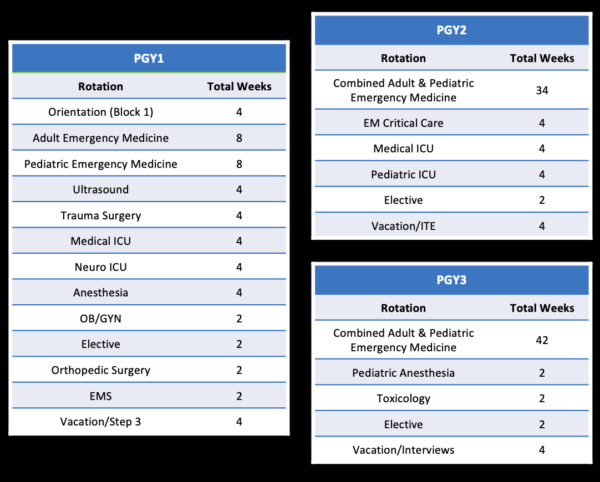

Our program is designed to provide you with a robust and diverse clinical experience by rotating through four different EM clinical sites within the Detroit Medical Center. Take a look at our hospitals.
In the first year, you will build a foundation of core EM clinical skills and knowledge with about half of your time spent inside the Department of Emergency Medicine (the orientation, adult and pediatric emergency medicine, and ultrasound rotation are based in the ED) and the remainder of your time spent rotating on other services to learn how to apply principles of a variety of specialties to your career as an emergency physician.
There is no integrated graduation of responsibility when you are in the emergency department — any resident can pick up patients throughout the department and no sick patient is off-limits to anyone. Although interns do not start off leading codes on day 1, PGY1s are expected to go to all medical and trauma resuscitations where you will build up your procedural skills (resuscitation procedures are typically performed by a PGY1) and preparation to direct resuscitations on your own (typically beginning to lead codes toward the end of PGY1).
Your second year and third years will provide concentrated experience in the emergency department with a few additional months of critical care training, where you will have progressive decision-making responsibility. You will also broaden your skillset and challenge yourself with additional responsibility in the Receiving ED and at the tertiary Harper University Hospital ED, suburban community emergency department at Huron Valley/Sinai Hospital, and pediatric emergency department at the Children’s Hospital of Michigan.
Throughout all three years you will be paired with a mentor who will help guide you as you progress through residency and beyond. We have attendings with a wide variety of fellowship training as well as interests including — but not limited to — toxicology, ultrasound, international medicine, disaster medicine, sports medicine, hyperbarics, finance, administration, research, education, etc. Our goal is to pair residents with attendings that share similar interests and can provide focused guidance.
Healthcare simulation spans a wide variety of formats, from the low-tech actor portraying a standardized patient to high-fidelity, mannequin-based human patient simulators (HPS). The Department of Emergency Medicine has been a pioneer in simulation at Wayne State University. With access to multiple types of simulators, residents are able to practice state of the art medical care in a realistic, safe environment with real time feedback. Even at the intern level, residents are able to perform difficult procedures and lead complex patient resuscitations.